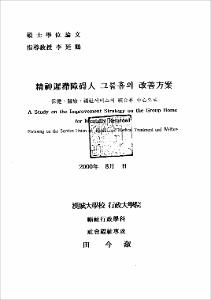精神遲滯障碍人 그룹홈의 改善方案
- Files in This Item:
-
-
Download
 000000066060.pdf
기타 데이터 / 2.82 MB / Adobe PDF
000000066060.pdf
기타 데이터 / 2.82 MB / Adobe PDF
-
Items in Repository are protected by copyright, with all rights reserved, unless otherwise indicated.
 000000066060.pdf
기타 데이터 / 2.82 MB / Adobe PDF
000000066060.pdf
기타 데이터 / 2.82 MB / Adobe PDFItems in Repository are protected by copyright, with all rights reserved, unless otherwise indicated.